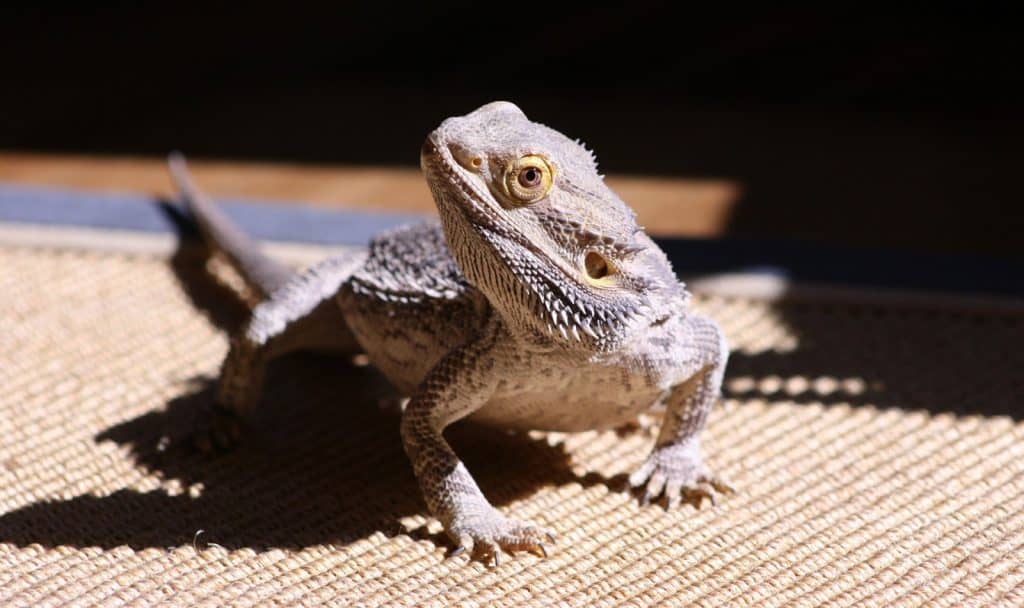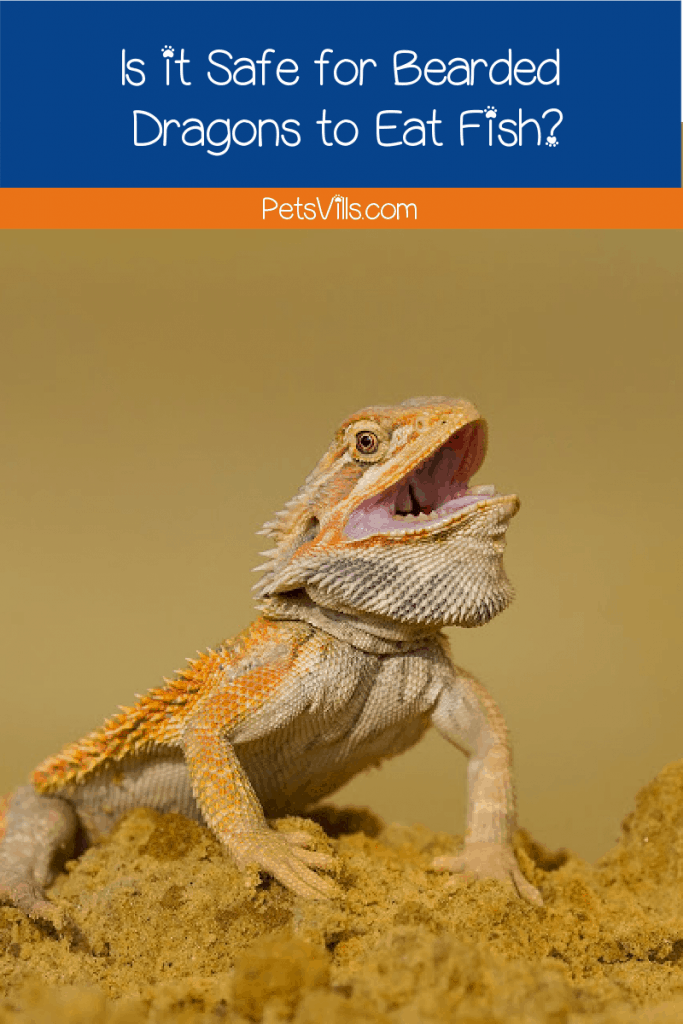Can a bearded dragon eat fish?
Whether you’re considering sharing your own salmon dinner with your pet or thinking of grabbing feeder fish, you need to find out first.
Keep reading for the definitive answer.
Plus, check out some other things that are off the menu.
Check and purchase this Complete Bearded Dragon Feeding Guide!
CAN BEARDED DRAGONS EAT FISH?
Can a bearded dragon eat fish? Short answer: NO.
Bearded dragons rarely eat fish when in the wild. So, it’s not a good idea to include fish in any of their diets.
These include raw fish, canned fish, feeder fish, cooked, or any other fish types.
Please keep reading to find out why you can’t feed your bearded dragon any type of seafood.
I have also discussed other foods you shouldn’t feed them and the types of food these lizards prefer.

Why Can’t Bearded Dragons Eat Fish?
Fish is an excellent source of protein for humans. But it doesn’t have the same nutritional value to bearded dragons as insects.
Raw fish may contain harmful bacteria, parasites, and germs that may hurt your dragon.
For instance, goldfish and rosy red minnows, which are popular feeder fish, contain a dangerous enzyme known as thiaminase.
This enzyme prevents thiamine uptake, also known as Vitamin B1, which is a source of energy for most animals.
It also leads to a deficiency in Vitamin B3 (Nicotinamide). In a worst-case scenario, this enzyme could lead to brain damage.
Beyond the thiaminase problem, fish can contain parasites that are dangerous to your beardies. These may include:
- Tapeworms
- Eustrongyloids
- Roundworms
However, researchers haven’t come to a conclusion on the exact effects of fish on beardies, but why take the risk? Consider where some of the fish comes from.
Some are reared with lots of synthetic chemicals that may be toxic to other animals. Besides, the bones could also choke your pet.
It’s just not worth the risk, especially when there are so many other options.
Foods that Your Beardie Shouldn’t Eat
Along with fish, there are some other things that you absolutely CANNOT give them. Check out the video below, then keep reading for more details.
Meat from Other Animals
Besides fish, you shouldn’t feed your lizard chicken, duck, turkey, beef, or any other meat that people consume frequently. Why?
These meats contain very high levels of phosphorous at the expense of calcium. The ideal calcium to phosphorous ratio for bearded dragons should be 1.5 to 2:1.
Excess phosphorous inhibits calcium absorption, which could lead to metabolic bone disease (MBD).
Some symptoms of MBD in bearded dragons include swollen legs and muscle twitching. If not treated early enough, your pet could suffer permanent deformities.
If your pet is lacking calcium, ensure they’re getting enough sunlight in the vivarium. You can also include calcium supplements and multivitamin supplements in thei diets.
Avoid feeding them meat products too. These include sausages, bacon, animal parts such as liver or the heart, ham, salami, pate, burgers, etc.
Besides having excess mineral levels, these products may also have additives that may not augur well for your pet.
Eggs (in Excess)
Eggs contain a wide range of nutrients, including proteins, Vitamins A, B5, B12, E and K, Selenium, phosphorous, folate, zinc, and fats.
Bearded dragons can eat eggs too. You can include scrambled or boiled eggs from chicken, ducks, and turkey in their diets from time to time.
However, since they have high levels of fats and proteins, feeding your pet too many eggs could cause Fatty Liver Disease.
Baby bearded dragons may need a slightly higher amount of proteins, but this amount reduces as they grow older.
Also, avoid feeding them raw eggs since they may contain harmful bacteria.
You can feed them eggshells, though, as a calcium supplement. But make sure you wash them thoroughly and crush them to powder.
Bread
Bread is also on the list of foods beardies shouldn’t eat. They are starchy foods, which aren’t their natural food since they eat plants, fruits, and insects when in the wild.
Their digestive systems aren’t equipped to digest foods like bread, since they may cause severe health issues such as digestive tract blockages or death.
Chocolate
DO NOT feed your beardie chocolate. This is because it causes theobromine poisoning in most animals.
Theobromine poisoning is common in cats and dogs since they have slower metabolisms.
When theobromine accumulates in their system, it causes vomiting, seizures, and other fatal symptoms.
Imagine what this poisoning could do to our reptile friends, who have slower metabolisms than cats.
If you really want to give him treats, try vegetables, crickets, or worms.
Cereals
Bearded dragons can’t eat rice, nuts, or corn, whether raw or cooked, since they have no nutritional value to them.
The same case applies to processed food from these cereals, such as peanut butter, cornmeal, pistachios, and cheerios.
Since they can’t ingest them, some of them will get stuck in the beardie’s digestive tract, causing impaction.
Impaction is one of the causes of death in beardies, and it may have symptoms such as regurgitation, paralysis in the back limbs, or swelling in the spine area.
Dairy Products
Milk is a good source of proteins, fats, and hydration. Like bread, bearded dragons can’t process milk, cheese, cream, or other dairy products.
They could cause diarrhea, kidney failure, and other gastrointestinal issues.
Dog and Cat Foods
Dogs and cats are carnivores, so their foods mainly contain a lot of proteins and fats.
On the other hand, bearded dragons are omnivores and rely on vegetables and insects to meet their nutritional needs.
While cat and dog food may not always harm them (it really depends on the type and ingredients), it doesn’t have enough nutrients. It’s just not worth the risk, either.
Human Baby Food
Typical baby foods are often a combination of rice, meat, dairy products, sweet potatoes, bananas, cereals, fruits, and many other food types.
The only baby food bearded dragons can eat is safe fruits such as papayas, bananas, grapes, pears, raspberries, and fresh vegetables.
Other Foods You Shouldn’t Feed Your Beardie
- Mushroom
- Honey
- Coconut
- Bees
- Wasps
- Scorpions
- Chips
- Fries
- Moss
For complete details, check our newly-launched ebook!
What Should I Feed My Bearded Drag?
The best food items you can feed your beardie include vegetables and insects, especially live feeder insects such as;
- Crickets
- Locusts
- Dubia roaches
- Pinky mice
- Fruit flies
- Black soldiers
Bearded dragons can eat a wide range of insects, but you should be careful with mealworms, butterworms, and silkworms since they may cause rapid weight gain.
Snails, cicadas, slugs, and lizards may be good options. But don’t hunt them directly from your garden.
And don’t allow your pet to hunt them on his own either, because they may contain pesticide residues and other harmful pathogens.
How Often Should I Feed My Beardies
Below is the ideal feeding frequency according to the beardie’s age.
Adult Beardies
According to the reptile.guide, one meal per day is enough for adult bearded dragons.
You can skip a day and feed them at least 3 to 5 times per week, and they’ll still be fine. A mature beardie needs 80% of veggies and only 20% of proteins.
So the meals can include a salad of kale, alfalfa, dandelion, endive, and all the safe veggies he/she can eat.
You can feed them up to 10 crickets per day, but if they are gaining weight too fast, reduce this number to at least 10 crickets per week.
Baby Beardies
Baby dragons can eat as many times as they can. When they’re born, to when they’re 3 months old, they should be fed up to 5 times per day.
Once they’re 3 months old, reduce the frequency to 4 times per day until they’re 6 months old.
Three times per day is enough for baby bearded dragons older than 6 months.
Wrapping Up
And that’s it. Bearded dragons shouldn’t fish, meat, meat products, dairy products, grains, and processed foods. Instead, stick to veggies, fruits, and live insects.
If they accidentally feed on any of the inappropriate foods, don’t fret. Your vet can advise on the best course of action.

can bearded dragon eat fish? what do you think? share your thoughts below!
Barry Stingmore is a British content writer living in Fuerteventura, Spain. An animal lover at heart, he shares his home with a dog and four rescue cats and has a passion for writing about animals big and small.
Barry loves finding answers to your animal-related questions, the more research involved the better! You can rely on him to find the facts.
Find him on FACEBOOK, TWITTER AND Linkedin
Read his latest ARTICLES.
Find more about him HERE.


